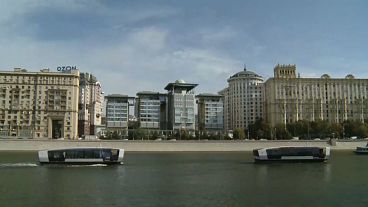Annual inflation has been easing since June, although August's total is still more than 10 times higher than the central bank's target.
Price rises are slowing in Turkey as the annual CPI rate fell to 51.97% in August, down from 61.78% in July.
The country's statistics agency, which released the data on Tuesday, also recorded the monthly change at 2.47% - lower than the 3.23% total seen in July.
Price rises primarily slowed on the month due to food price relief, with the cost of food and non-alcoholic beverages down -1.10%.
This category nonetheless jumped 44.88% on the year.
In terms of both annual and monthly inflation changes, the price of education and housing significantly drove up both figures.
Given an inflationary spike in 2023, the annual total must also be considered in light of base effects - as last year's results distort comparisons.
A fiscal policy U-turn
Easing price pressures are a sign that tighter monetary policy from Turkey's central bank is now taking hold.
In 2023, President Recep Tayyip Erdogan dropped his unorthodox opposition to interest rate hikes after Turkey's annual inflation rate reached a decades-long high of 85.52% in late 2022.
"The new government which took over last year completely reversed the economic policy and started a severe tightening of the monetary policy leading to increased policy as well as credit interest rates", explained Murat A. Yülek, professor of economics at OSTIM Technical University.
Turkey's benchmark interest rate is now at 50%, up from a low of 8.5% in May 2023.
Professor Yülek continued: "On the back of that [policy tightening], domestic demand slowed down and the production in the industrial sector contracted significantly in the second quarter of 2024.
"The fall is likely to continue through the rest of the year unless an unexpected domestic or international shock occurs".
When will rates be cut?
Prices in Turkey have been easing on an annual basis since June this year, but they are still more than 10 times higher than the central bank's target.
The CPI hit 75.45% in May, the highest level seen since late-2022 - following a decline throughout the first half of 2023.
Many analysts are expecting a modest interest rate cut in December, depending on Turkey's inflationary trajectory.
"Even though monthly inflation has dropped significantly compared to last August's, Turkish inflation is still high," said Kamil Yilmaz, professor of economics at Koç University.
"If the government continues to allow the Central Bank to stick with its tight monetary policy and couples it with tight fiscal policy for at least two more years until the end of 2026, then we may hope to reach inflation levels close to the single digits.
"However, this is a big issue because different segments of society and businesses are already badly affected by the current tight monetary policy, and it will only be a matter of time before they start protests against the government."
The annual rate of core inflation, which excludes volatile energy and food prices, declined in August to 51.56% - from 60.23% in July.















